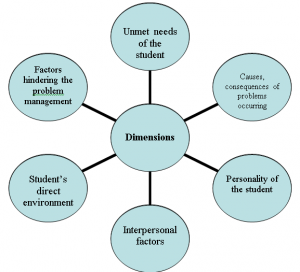

Click on the Download button to get the tool in a PDF file, which you can print out easily
downloadDiscovering and mapping the features of the student are essential for both the teacher and the specialist. That is why we collect data. Data collection is a complex procedure since the student, his/her environment, teachers, school mates all see the situation, themselves and the student from different points of view. Therefore it might happen that we got contradictious information. During data collection numerous dimensions are to be considered, the most relevant you find in the graphic below.

So data collection is based on several aspects and the knowledge necessary for gathering them is also comprehensive: biophysiologic, psychic, cognitive, motivational, environmental, cultural, behavioural, family related knowledge are all necessary. There are various methods we can apply: observations, interviews, environmental study, family visit, formal or informal communication from others, questionnaires. It is important to emphasize that information gathered are sometimes subjective, might be influenced by the interest of the participants. The other important principle which should be observed is the student’s right to secrecy.
Data collection determines, in a planned way the direction and the method of the help given, increases the efficiency and effectiveness of the co-operation and problem-solving. The effectiveness of the expert working with appropriate data is increased, his competency is unquestionable.
The most determining source of information is the student him/herself. Beside the physical characteristics, appearance, health and mental status, the interview (see attached the suggested interview draft), the information got during personal discussions, and the discussions during the daily work are all have great importance. They give us a lot of information about his/her values, emotions, behaviour, personality, management of emotions, maturity, level of aggressiveness, self-image.
As attached information sources we consider the family, friends, neighbours, pedagogues teaching the student on the one hand, and on the other hand other experts working with the student: e.g. psychologists, medical doctors, and all the persons concerned in this context. The other most important source of information is perhaps the interview made with the parent, parents or care person, patron, tutor by the state. (Scheme of the interview is attached.)
Beyond the discussions there are further documents which we may find informative. One would not think that - sometimes parallel, at supportive institutions - there are an almost full documentation about the student. These should be handled with special care, since secrecy rules are particularly relevant!
Data collection is the first step of the personal development of the student and also of the setting up of the personal development plan. Obviously, besides the documents and discussions, we should not forget about our own observations and experiences! We have the possibility to observe the student not only during the lessons, but also during school breaks, on the spot of his/her professional training, we can follow his/her activity in the community life, and we can get information about his/her mental and physical state when coming to school. All these impressions contribute to the creation of a detailed image about the student. It is certainly not easy to make notice of all these information, therefore we suggest keeping a separate folder for each student, so we can, whenever and wherever we want make notices about the student.
User's guide, equipment:
On oktataskepzes.tka.hu we use cookies to give you the best possible experience. By using this website you accept cookies.